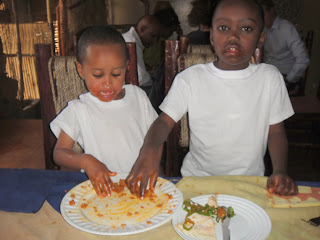With all of the shouting and commotion from the boys, I assumed they were mesmerized by the city, which they had only seen on occasional trips from the orphanage to the doctor. However, it wasn't the tall buildings or fancy stores that captivated these young men. It was vehicles. Why was I surprised? And why I surprised that vehicles never lost their fascination? Lots of vehicles. Big ones. Long ones. Three-wheeled ones. The word we heard them shout the entire day without getting old...to them anyway...Makeena!
When I type that word, I do so phonetically using the English alphabet. Amharic looks like Chinese...or Japanese...whichever is written horizontally. FYI: Horizontal goes across; vertical is up and down. I explain that because some people get those confused...an adult living in our house. I know you are dying to learn Amharic, so stay tuned for a list of important words and phrases.
Bisrat took us to the local leper colony...a literal gated and guarded community filled with lepers including their own hospital and pharmacy. Doesn't sound too bad. The lepers aren't banished from town. They choose to live there, and a few non-lepers have joined them.
I picked up a few items that I absolutely didn't need in their souvenir shop. Just doing my part to support the lepers. Most of the items in the shop are made by the lepers...starting with piles of cotton the women take and turn into what looks like ratty pieces of yarn. They wind them perfectly around spools. Or is the stick with no yarn called a spindle?
I was mesmerized by their work, so I missed an important step. But then a guy wraps the thread around a loom. I honestly don't know if that's the correct term. Need to freshen up my weaving vernacular apparently. If it is a loom, it's the most primitive form. I mean these tools (looms?) look about as decrepit as the lepers themselves.
Well, you get the picture. The lepers take plain old cotton and turn it into dresses and scarves and such. Many do this with no fingers, or under a blanket to hide a deformed face, or without a leg (which isn't really necessary for weaving, but still!).
They work because they have to. No one says, "Oh, you can't work because you only have nubs (or stubs)? Here's a paycheck every month for the rest of your life." Don't get me wrong: Disability in the US is definitely needed. But perhaps the system is occasionally abused. And, I guess I'm just perplexed over the drastic differences between the two countries' systems.
Lunch was at a place that served both American and Ethiopian cuisine. So I breathed a sigh of relief and was able to eat. Yay! And the boys ate more than I've seem them eat so far combined.
How? They are boys.




No comments:
Post a Comment